|
By Mark -Brian Sonna
February 1-14, 2007
|
Fall in love with this amorous, rapturous, musical, comical, and touching production. We'll present in one evening a group of short plays, poems, songs, and performance pieces dating from the present era all the way back to the Roman era that deal with love in all it's glory, deception, and exuberance. You’ll hear rare love songs from the middle ages to popular standards of the 20th century. You’ll discover how people throughout the ages have fallen in an out of love. Theatre of Love is not just a musical theatrical show, but an experience to be shared with a loved one.
And yes, we can make your engagement part of the show...The show is written so that if you want to ask that special someone to be in your life forever, your proposal can be part of the “plot” of the show!
You are in love and are getting ready to "pop the question." You know who it is but...How? Where? When? and What do you say before you ask the question? Let us arrange it!
Theatre of Love is written in such a way that during every performance one couple can get engaged. Make your engagement the most memorable by making your proposal be a part of the show. The show is written with enough flexibility that a man can ask a woman, a woman a man, or even same sex couples can get engaged. Upon "popping" the question, your loved one will recieve a bouquet of flowers and a gift basket full of romantic goodies.
|
|
TheCast:
(in alphabetical order)
|
Sherna Armstrong
James Casarez Jr.
Sarah Enriquez
Wesley Raitt
Richard Rollin
Deanna Sarkar
Roger Schwermer
Mark -Brian Sonna
Paula Wood
|
|
Program:
(With commentray by Mark-Brian Sonna)
|
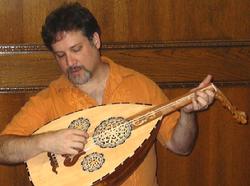 |
| Mark-Brian Sonna playing the Oud |
|
Love, Music & Lyric by Mark-Brian Sonna, 2007 This is song has only one word as a lyric & four notes. When I first presented the song to the singers they looked at me as though I was crazy. It’s deceivingly simple at first, it becomes complex, then it becomes discordant, & finally it reaches a majestic crescendo chord that is mostly harmonious. Just like love.
Poem V, Catullus, 54(?) BC Outside of Dante, this is perhaps my favorite poet. Of his work, this is my favorite poem. Though he’s admired by academics & people into “literature,” he’s not as well known to the world, which is a shame for he is so accessible & easy to read if translated properly. The biggest mistake made by translators is they choose “big” words & try to force a metered rhyme which destroys his jovial wordplay. I compromised: I broke the meter but kept the wordplay.
To Anthea, Robert Herrick, 1648 Most people think this poem is original while it is truly a paraphrase of Catullus’ Poem V. In his lifetime, Herrick always gave credit to Catullus, but it’s the academics over the centuries that have erred & failed to mention it. By putting these two poems side by side I’m letting the audience choose which they like the best.
|
 |
| Cantiga V |
|
Cantiga V, Music & Lyric, Martin Codax, 1230 This was a “pop” song back in the 1230’s. The very sad yet gorgeous song is Galician-Portuguese (pre-Portuguese). The simple lyrics are composed of eight sentences. Yet with the change of one word & one word placement in each sentence, the song shifts from a song of joy to one of sorrow. The repeated verse “& we shall bathe in the waves!” goes from celebratory to an act of suicide.
Egloga Representada en Requesta de unos Amores, Juan del Encina, 1495 This raucous, randy, rollicking comedy, conclusively proves that people then as now enjoyed crude humor. This was the “American Pie” of its era.
To His Coy Mistress, Andrew Marvell, 1651/52 Most people are familiar with this poem because it was required reading in High School. Why? I have no idea. The language is so dense in it, & the subject matter… well no teacher ever told me what it was really about. It wasn’t until I was in my 20’s that I “got” this poem, & realized it’s the most eloquent piece of filth written & it’s hysterically funny. This should be taught at University level.
|
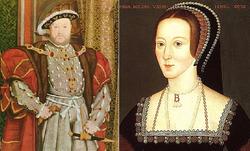 |
| Henry VIII & Anne Boleyn |
|
Greensleeves, Lyrics Henry VIII, 1580, Music Henry VIII(?) or anon. 1652(?) Historians bicker about the authenticity of Henry VIII writing this song. Melodically it’s correct for the era, & historically it is accurate; but there is no conclusive proof he wrote it. To me it boils down to common sense: it sounds like him, the phrasing matches his patterns of speech & writing, & it matches his temperament & his way of thinking.
Sonnet #18, William Shakespeare 1609, This show had to include Shakespeare. Most people know & recite the opening line, but then they have no clue how the rest of the poem goes. I thought it might be nice to share it.
|
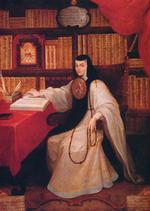 |
| Sor Juana Ines de la Cruz |
|
Sonnet #167, Sor Juana Ines de la Cruz, 1690(?) This nun achieved literary fame in her lifetime. Because she was so famous her work was translated widely which has proven to be a curse. Sadly the translations were done in an era where the translators’ main objective was to keep meter & rhyme versus accurate content. This no longer is the case with new translations, & it is making older texts much more accessible. Unfortunately most of her works hasn’t been translated since her era. I offer a new translation tha captures the wit & humor that makes her so beloved.
|
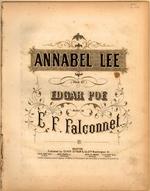 |
| Annabel Lee sheet music |
|
Annabel Lee, Edgar Allen Poe 1849, Music E.F. Falconnet, 1859 Most people don’t realize that Edgar Allen Poe was open to the idea of this poem being used as the lyrics to a melody. This famous melody that accompanies his famous poem somehow has been forgotten over time. We are reuniting them once again.
A Sunny Morning, Joaquin & Serafín Alvarez Quintero, 1905 This is considered the best example of the genre of “Teatro Breve”. It is the only play in this genre that played on Broadway back in the 1930’s when a group of Spanish plays was presented. The English translation from that era “cleaned” up the language & sanitized the story. I’m please to give it a much more accurate translation.
|
Un Bel Di, Giacomo Puccini, 1904 One not need to know what the lyric say in Italian to feel the effect of this love song. Longing transcends all languages.
My Melancholy Baby, Lyric George A. Norton, Music Ernie Burnett, 1911 I first heard this song on one of Barbra Streisand’s albums. I thought it was a song from the 1960’s. I was surprised to realize that it was an old parlor song. It still is remarkably contemporary.
|
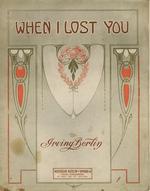 |
| When I Lost You sheet music |
|
When I Lost You, Music & Lyric Irving Berlin 1912 This was Irving Berlin’s biggest hit that year & remained one of his most popular song for over a decade. Now it’s mostly forgotten. Why? I don’t know. It is a gorgeous song.
After You’ve Gone, Music & Lyric Creamer & Layton, 1918 This song is a singer’s dream. When performed in it’s entirety, which not many people do, the song shifts from being sad, to spiteful, to affirming.
Poema 20, Pablo Neruda, 1924 What can be said about the most famous poem ever? Nothing. It would be a grave omission not to include it in this show. Oddly enough, most English speakers don’t know this poem.
|
 |
| My Man sheet music w/ Fanny Brice on the cover |
|
Mon Homme, (My Man), French Lyric by Albert Willemetz & Jacques Charles, English Lyric, Bibo-Wood, Channing Pollock, Music by Maurice Yvain, 1920 This is an example of a song that got better with each re-write. Florence Ziegfield knew how to spot a good tune for a show, & he knew when it needed to have a lyric rewrite, or two or three.
Two Couples Two, Alejandro de la Costa, 2005 Inspired by Telenovelas, this brief comedy is fun to watch for all the massive dysfunction.
Do it Again! Lyric BG De Sylva, Music George Gershwin, 1922 This song clearly demonstrates that raunchy explicit lyrics are not a new thing. The cast gasped when the lyrics were read aloud for the first time.
You Made Me Love You, Lyric Joe McCarthy, Music James V. Monaco, 1913 This standard is one of the best constructed songs ever. It plays well if sung fast, slow, mid tempo. The simple lyric can be interpreted as sweet, sexy, bitchy, etc.
Seduce Me, Mark-Brian Sonna, 1982 This was written in my diary as a teen when I had a crush. Several years later I was commissioned to write my autobiographical play, “Persistence in Memory.” I incorporated the poem into the play. Everyone requested copies of this poem, & it went on to take a life of its own
|
 |
| John Cooper Clarke |
|
I wanna Be yours, Performance Lyric John Cooper Clarke, 1982 I must give special Thanks to Mr. Clarke aka the Bard of Salford for allowing the use of this piece. I never cared for the Punk Rock movement in England musically, but I loved some of the clever lyrics, & admire greatly the spirit behind it. He is considered one of the best lyricist/poets living. His words are so simple yet he’s able to express such genuine truths in human emotion with a great dose of humor. This Lyric/Poem was recorded back in 1982 on the album Zip Style Method. I couldn’t find the sheet music for it & contacted him about it. He told me not to bother & to do it without the music because “I doubt you’ll need any dots as it was written by escaped retards from a Guatamalan insane asylum.” While the Sex Pistols & the Buzzcocks remain icons of the Punk Rock era, Mr. Clarke’s poetry in the last two decades has gathered a momentum of its own. Strangely enough, there has only been one book published of his work. He is one of the few living poets with a world renowned reputation, & has been lumped with Shelley & Ginsburg for his impact on contemporary poetry. This in part may be to his lack of motivation, as he’ll readily admit “There's only one person I know who's lazier than I am, & he's an insomniac bed wetter.”
|
 |
| Mark-Brian Sonna |
|
Dream Café, Mark-Brian Sonna, 2006 Love unrequited is a common human experience, as is breaking up. This play has resonated with all my friends because the setting & the awkward dialogue mirrors their experiences. Everyone that has read it or seen it that knows me thinks I wrote it about them. The real Tony knows who he is, & I dedicate this play to him.
Sonnet XLIII, Elizabeth Barrett Browning 1845/46 This is another must for this show. Like the Shakespeare’s Sonnet #18, most people can recite the first few lines, but get lost soon afterwards.
Clueless, Dr. Peggy Mitchell, 1999 I delight in finding & rediscovering old treasures. I decided for this show I’d set my sights on finding a new treasure. After reading hundreds of poems, some lousy, many trite, & nearly giving up, I ran into, or I should say Dr. Mitchell ran in to me. She has self published a small tome of jewels, every poem in her book is an intense emotional experience. Here is a new voice in poetry that must be reckoned with.
The Glory of Love, Billy Hill, 1936 This is one of my mother’s favorite songs. I never cared for it as a kid, but as I grew older I began to understand it, & now I rank it as one of my favorites too. It’s so easy to sing along to that I encourage the audience to do so.
All translations are done by Mark-Brian Sonna.
|
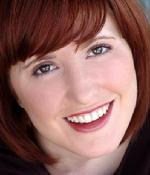 |
| Kelley Vest |
|
With KelleyVest
Kelley Vest, a freelance journalist interviews
Mr. Sonna about his latest projects.
|
What was the inspiration for Theatre of Love?
I love the genre of “Teatro Breve” which is a Spanish form of theatre in which the plays are ultra short and last only between 5 to 15 minutes. I’ve been producing a show by the title of “Theatre of Death” over the last several years and this in a roundabout way inspired “Theatre of Love”.
I was approached over a year ago about creating a show for Valentine’s Day. My show “Theatre of Death” was playing at the Addison Conference and Theatre Center, and was attracting quite a crowd. Having read countless of scripts in the “Teatro Breve” form of theatre which make up the plays of “Theatre of Death”, I had stumbled across many that didn’t deal with death but dealt instead with love. I immediately thought of 3 scripts. I told them I could and would do it. The show was then booked for February 2007.
Your "Theatre of Death" productions have been very successful. Did you find it easier to put together a show about love than death?
At first yes, then no. My original plan was to do a replica of “Theatre of Death”, the difference being that the subject at hand was love not death. I’d read many scripts for Theatre of Death, and in many of them no one died. I knew of quite a few scripts that would have fallen in the love category. Selecting them to create the show was going to be a breeze. Then it hit me. “Theatre of Death” is such a unique show; I would basically be knocking off my own show. Why do that? I decided instead to create a new show. I would incorporate some poetry, and some music in it. Then instead of the musical interludes between each piece as I do in the “Death” show, I would have a narrator introduce each piece, and then make a comment, be it sarcastic, or philosophical after each piece. I began actively writing the part of the narrator and I, by quite an accident, discovered I’d rhymed the first four lines. That set me off in a new direction, and a much more difficult direction. I ended up writing an entire script, weaving the plays, poems and music together to create a whole new script. Though I’ve written in verse before, I’d never attempted to write an entire play in rhyming verse. The beauty of the rhyming verse is that it allows the narrator to be exceedingly funny. The play of words in the play makes the narrator sarcastic, witty, and gay. The hardest part, you see, is to make the narrator’s voice sound like plain speak to you and me. After struggling with the rhyme for a while, I got the hand of it and without much thought I can now do it and make you…smile.
How did you select the pieces that are in this show?
I knew immediately I wanted to do the Quintero Brother’s “A Sunny Morning.” This is perhaps the most critically praised play in the “Teatro Breve” genre. It is a gem of a play. It hadn’t been translated since 1914, and the original translation was rather stuffy, and diminished the humor in the piece. I also knew I wanted to do Juan Del Encina’s comedy about a drunk man trying to “pick up” a hot woman, only to be trumped by a hot young nobleman’s attempt to woe her with money. Though it dates back to the 15th century, this play is completely contemporary for the situation plays out in just about any bar on any weekend. Alejandro de la Costa had a short and outrageous brief comedy that reads like a bad, bad, bad, soap opera, with more secrets divulged in the 13 minutes it plays out than most full length movies. I also wanted to include poetry, and I knew I had to include Shakespeare, and Browning. I made a point of including poetry that is very well known. I wanted the audience to have an “a-ha!” moment. I chose pieces instantly recognizable, but because I was putting them in a context of a scene, it fleshed out the poem. Andrew Marvel’s “To his Coy Mistress” is familiar to most since it is required reading in High School English classes. Most people will have forgotten it because frankly it’s a bit of a difficult poem to just sit and read, even though it’s brilliantly funny. By placing it in the context of scene in a play, the poem’s humor jumps out, and when delivered as a monologue, the archaic language melts away and the poem makes lots of sense for those that would normally hate dense verse. Then I chose the music. I knew I wanted Martin Codax’s Cantiga V from 1230 for it is remarkably beautiful and such a simple tune. Like the poetry, I wanted to include either famous pieces of music but place them in a context that people might not have thought of before, or lesser known works that would startle people for they would seem exceedingly modern.
Is there much music in the show?
Now there is. I had originally planned on 6 songs. But seeing the talent I had come to the audition I added 5 more songs. We won’t have a full orchestra, just a few instruments, and many are sung a capella. My goal is to showcase not musical arrangements, but the beauty of the songs themselves, hence why all the arrangements are so pure and simple.
What do you want your audience to take from this show?
The whole point of the show is to unequivocally demonstrate that humans, regardless of the time they lived in fell in and out of love the same way we do today. In the process I want the audience to get, and I know this may sound corny, the warm fuzzies….and for the lucky few an engagement or two.
An engagement?
I wrote the show so that if a couple, regardless of their sexual orientation, wish to get engaged it can be woven into the fabric of the show. The musical is somewhat interactive with the audience, and because it deals with love I thought it would be fun to let the show be a platform for an engagement. If an engagement doesn’t happen a different scene plays out. I must confess that I did write the engagement scene with two possible outcomes: the person being asked says “yes,” which is the ideal ending, or says “no,” which will be awkward but then leads to a comic moment. In live theatre you must be prepared for anything.
What production are you producing next?
After this I’m producing “The Soul Gatherer.” This is a much darker script. “Theatre of Love” is definitely a musical comedy. “The Soul Gatherer” is a terrifying journey into the dark recesses of my brain, or so I’ve been told by the few souls who have read Act 1 of the script. I won’t divulge Act 2 or Act 3 to anyone yet. It’s hard to cause the emotion of fear in an audience in live theatre, but I’ve been successful in spawning nightmares with some of the short works I’ve created for “Theatre of Death.” So I guess I’m running from light to dark.
Which do you prefer doing? The “Light” or the “Dark”?
I really love them both. I think like most people I enjoy a good laugh and a good scare. If I did all scary stuff all the time I think I’d get depressed. I love a good, joyful, heartfelt laugh. And that is exactly what “Theatre of Love” is all about.
|
We are pleased to announce that our show received 2 Column award nominations.
Best Sound Design: Mark-Brian Sonna
Best Stage Manager: Paula Wood
"BEST BET" Dallas Voice
"GUIDE PICK" Guidelive.com
“Theatre of Love: The Perfect Valentine’s treat. MBS Productions' Theatre of Love is a pleasant mixture of songs, poems and short plays which all have a common theme: love. The show… is quite freewheeling and almost improvisational in nature…..The four men and four women who made up the troupe in Theatre of Love were all talented and had energy and enthusiasm to spare. Coming out especially ahead in the evening were Sherna Armstrong, who belted out a goosepimple-inducing "My Man"; Sarah Enriquez, who used a delicious New York accent in the comic playlet Two Couples Two; and James Casarez, Jr., who enlivened the evening by playing the trumpet (when not dressed as an adult Cupid!) Director Mark-Brian Sonna has engineered a truly creative evening. …Theatre of Love is quite simply, far different than any other entertainment to be found in Dallas at the present. A lively band of youthful entertainers are ready to take you through an exciting evening. I had a smile on my face as the evening came to a close, and so will you.”
Joseph Melnicoff, Broadwayworld.com
"Best of the Weekend...check out an array of short plays, poems, songs and performance pieces."
Ann Pinson, Dallas Morning News
“It’s a musical romp that touches your heart: a smash up of song, poetry, dance, and performance art into one theatrical evening that will plaster a big smile on your face while bringing a tear to your eye!”
Alejandro de la Costa, playwright
"'Theatre of Love" is a show where nine performers re-enact 26 moments, -some famous, some infamous- of 'love' throughout history. No other show you’ll see combines the glory of Shakespeare, the bawdiness of Vaudeville, the heartbreak of Poe, a saucy Gershwin tune, Henry the VIII’s dysfunctional marriage to Anne Boleyn, an old couple bickering over a park bench, a bad magic act involving decapitation, a clarinet, Madame Butterfly, a punk rock tune of John Cooper Clarke, and a man impersonating Barbra Streisand, while all the while making you laugh, and yes, at times even cry." Event Alert.com
|
|